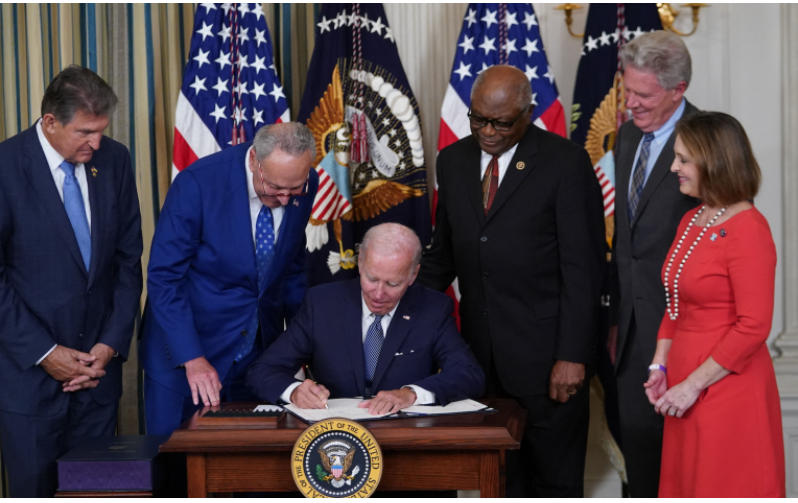Image Source: Mandel Ngan/Getty August 16, 2022 – Today, US President Joe Biden signed into law the Inflation Reduction Act of 2022 (IRA), putting the U.S. on a path of somewhere between 32%-42% greenhouse gas pollution reduction below 2005 by 2030. The House passage of the act on August 12 came less than a week after the legislation passed the U.S. Senate. The difference between the best-case (42%) and worst-case emissions (32%) scenarios is dependent on the market. High fossil fuel prices will encourage companies to look for alternatives like wind and solar while those alternatives will quickly become cheaper in the best-case scenario (42%). While a sustained period with cheap fossil fuels would hinder rapid decarbonization. This is the first comprehensive climate legislation in U.S. history. Compared with Congress’s desultory approach to the issue in the past, the numbers are striking. The legislation will spend roughly $374 billion on decarbonization and climate resilience over the next 10 years, getting the USA two-thirds of the way to America’s Paris Agreement goals in the best-case scenario. Grassroots energy helped keep climate change on the agenda for congressional action throughout months of uncertainty and the rollercoaster ride in the push for the IRA’s predecessor, The Build Back Better Act. Citizens’ Climate Lobby (CCL) USA supporters generated more than 200,000 calls and emails to Congress since last July, urging lawmakers to be as ambitious as possible with their climate action. “This major climate bill is a demonstration of democracy in action,” said CCL USA’s Executive Director, Madeleine Para. “It takes time, effort, and negotiation from lawmakers to get significant legislation across the finish line. At CCL, we’re eager to build on today’s big step forward and continue to work for even more, and even better, climate action in the future.” The impact of this bill will ripple across continents. By putting the US on the path to cutting global warming pollution, the IRA helps keep the Paris Agreement alive and demonstrates to the world that the USA is committed to climate action for the long term. “I joined the CCL in 2010 because the USA is Canada’s largest trading partner,” says Cathy Orlando, National Director of CCL Canada. “For the first time, national legislation in the US, taxes, incentives for small businesses, and everyday economic activity will align with a transition away from greenhouse gas pollution. The race to net-zero is now on in North America!” According to various expert analyses, the Inflation Reduction Act will also curb fossil fuel air pollutants and their adverse health effects; reduce the federal deficit; create jobs; boost the economy and lower average household energy bills. But Republican senators and congresspersons rejected such assessments and voted in lockstep unanimity against efforts to pass the legislation, forcing Vice President Kamala Harris to break several 50-50 tie votes in the Senate. In the midst of this celebration, CCL Canada recognizes that no single legislative win on climate solves the entire problem. The IRA contains mostly “carrots” with one small “stick”; a fee on methane pollution. Indeed, there is still work to do to meet America’s climate goal of reducing emissions by 50% by 2030 and addressing the concerns of frontline communities about the continued harms of fossil fuel production. Fossil fuel interests forced painful concessions in negotiations – requiring the government to offer new areas for drilling in Alaska and the Gulf of Mexico, as well as more oil and gas leasing on public lands. “There is still more work to be done but first the IRA is to be celebrated as a huge step forward,” says Orlando. “This is one of the most significant developments for international climate action in the 30-year history of the United Nations Framework Convention on Climate Change. ”Historic US Climate Legislation Signed Into Law
FOR IMMEDIATE RELEASE: August 16, 2022
Media Contact: Cathy Orlando, 1 705 929 4043, cathy@citizensclimate.org
Historic US Climate Legislation Signed Into Law
Home » CCL Canada News » Historic US Climate Legislation Signed Into Law













